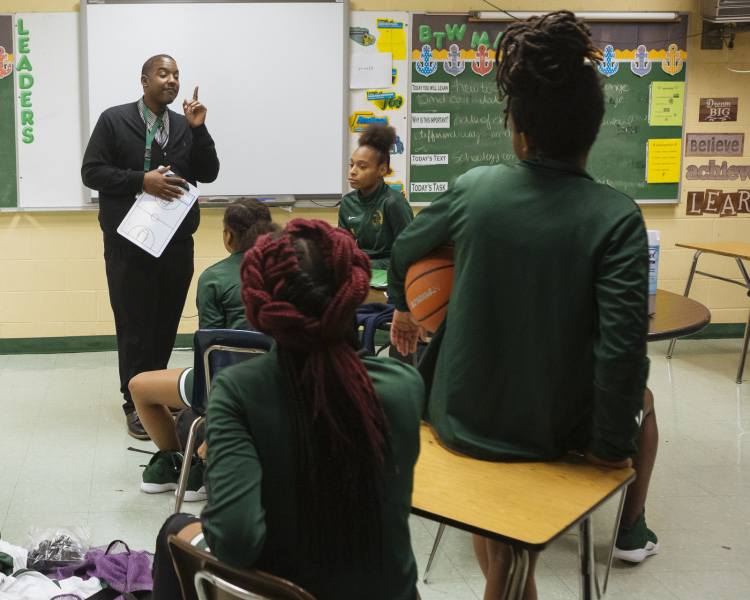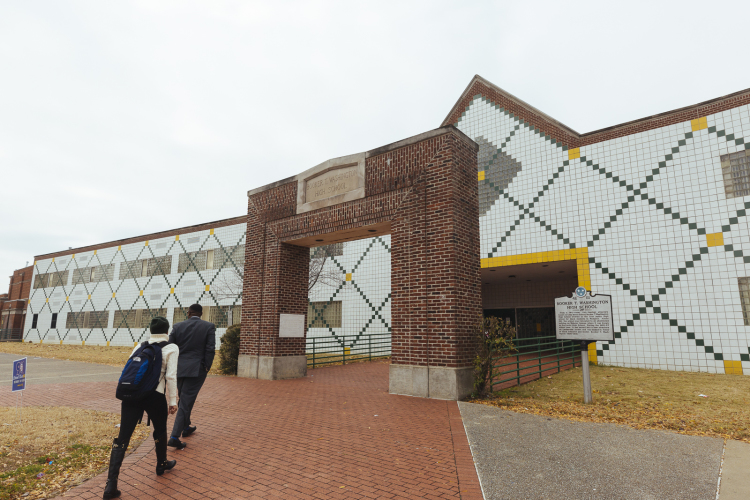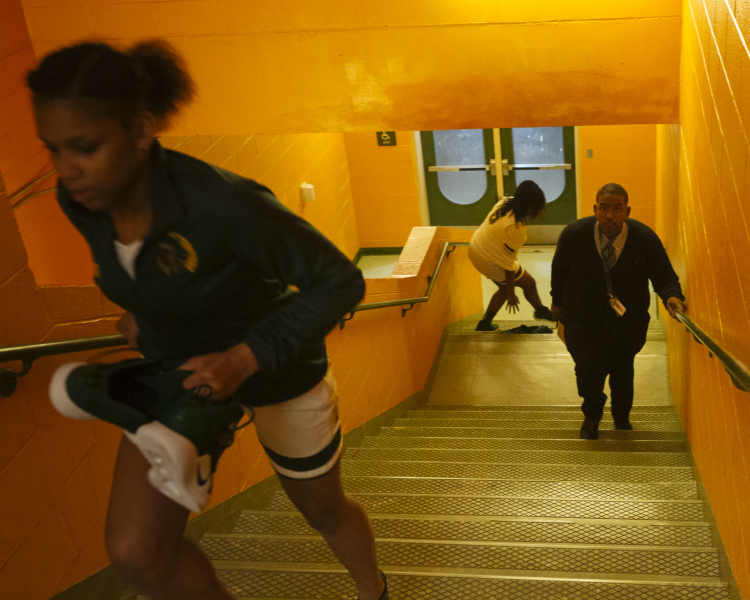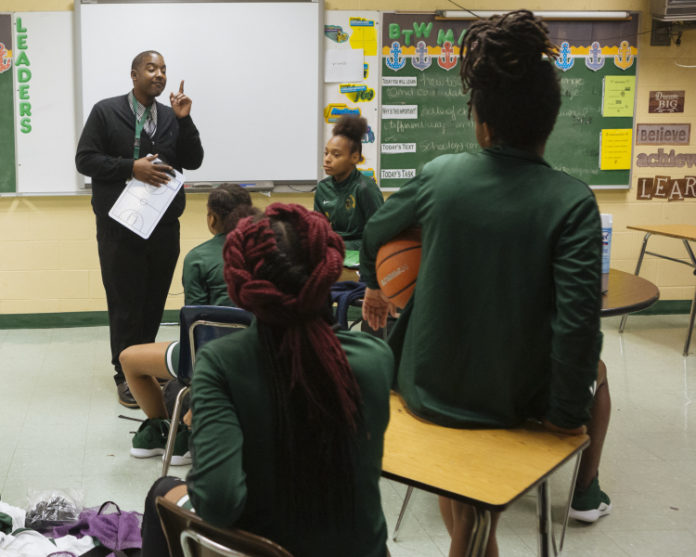By Melonie Gaines, High Ground News
Less than a month after the class of 2010 walked across the stage at Booker T. Washington High School, new graduate Adrianne Cobb attended a party in Downtown Memphis.
A fight broke out. Gunshots rang into the air, one of which struck Cobb and fatally wounded her.
Her teacher and mentor Steven McKinney says the incident was a double tragedy.
“Here’s the worst part about it. One of her best friends, one of my students, is doing the time for it because he was one of the guys shooting in the air,” McKinney said.
Rodrecuas Tucker was found guilty of firing the bullet that killed Cobb. He is currently in the eighth year of his 17-year sentence.
Tucker was an athlete and a good student, McKinney said. Cobb was known for her sense of humor and perseverance.
“So, I lost two. My favorites,” McKinney said, adding that he would drive Cobb and other students and bring them to class on his way to Booker T. Washington in the South City area of Memphis.
“I have the stress of seeing what could happen to them,” McKinney said. “It’s the stress that knowing that the world that they live in is not for them to be successful, especially going in the way they are going.”
Related: “Sweep in clean: The leader behind Booker T. Washington’s comeback story”
The loss of students to death and criminal activity brings a heavy toll to teachers like McKinney who work in some of the poorest and under-resourced communities in Memphis. Students who grow up in these communities face adverse childhood experiences, or ACEs, which can affect their behavior and education outcomes.
Groups close to this local issue are advocating for trauma-informed training for teachers and a district-wide culture of self-care to support teacher retention.
CARRYING THE WEIGHT
Teacher retention strategies have been an ongoing discussion in school districts like Shelby County Schools which face the challenges of educating a population of students born into generational poverty and under-resourced communities.
According to the 2018 Poverty Fact Sheet, 39 percent of children in Memphis live in impoverished households, the majority of which are Black and Hispanic/Latinx. And taking care of children living in poverty is not solved at home — it’s carried over into the schools. Mckinney’s home base at Booker T. Washington is located in ZIP 38126, the poorest ZIP code in Shelby County and one of the poorest in the nation.

McKinney, who also coaches the Booker T. Washington Lady Warriors basketball team, deals with educating students and overseeing their well-being while they are inside and outside of his classroom.
“I got a kid whose mother is schizophrenic, and she texts me every day saying, “‘We don’t have anything to eat.’” He added, “Am I her last resort or her first resort?”
Teachers who educate children living in poverty can deal with compassion fatigue.
The burden of childhood poverty and adverse childhood experiences can lead to symptoms of burnout, chronic absenteeism, and inability to embrace change which can bring about feelings of depression, anxiety, and issues with substance abuse.
Cardell Orrin, Memphis director of Stand For Children, believes that when a school’s culture supports stressed and traumatized teachers, it can help the school be an overall stronger support system for at-risk students.
“There are some schools that I’ve seen that there is a non-judgmental timeout for teachers because they may be in a classroom and they just need a minute and they were triggered,” Orrin said.
McKinney, an 18-year teaching veteran, said the additional pressures over testing, performance evaluations and compensation make it harder to show up each day.
McKinney is an anomaly within public education. He is a Black male educator with a consistent Level 5 performance level, the highest rating a teacher can receive in their professional evaluation using the Teacher Effectiveness Measure. And for a district that educates majority Black and Hispanic/Latinx students, it’s important to retain high performing teachers of color.
A 2014 Tennessee Department of Education policy brief found that “over a third of minority teachers who earn a Level 5 switched schools between years,” which can have a ripple effect on quality instruction. Black teachers with five or more years of experience, like McKinney, only make up 11 percent of educators across Tennessee.
McKinney said the weight of educating and relating to minority students often falls on minority teachers who work in communities that look like them. He recalls that his hardest days in front of the classroom are the day after a traumatic event in the community.
“My hardest day … that day is the day when Shugnug died. That day is the day that Adrianne died. That day is the day that Rodrecuas went to jail. That’s that day. Those days that when we had kids who I see were trying and they still get caught up in it.”
José Luis Vilson, executive director of EduColor, a coalition dedicated to uplifting educators of color, said that school districts need to incorporate opportunities for self-care if they want to retain highly qualified teachers.
Related: “New Memphis clinic considers the health effects of adverse childhood experiences”
“A big part of surviving is about creating spaces of self and mutual care,” Vilson said. “One of the blessings of creating a community is that it helps ease the tension and breaks the isolation stigma.”
But, the one thing that keeps many teachers hanging on is hope.
“It’s the engine we use in the face of what we see in so many of our schools,” Vilson said. “We saw decades of schools being underfunded, shut down and privatized, which can be demoralizing. Self and mutual care can only do so much in the face of wayward policy.”
Orrin adds that policy can be changed if more teachers with “on-the-ground skills” can forge what Vilson calls a “practice to policy pipeline.”
“We have to create pathways for administration to allow our best teachers to stay in the teaching side, but there is the other piece to the public service and advocacy where educator voices are important,” Orrin said.
“A lot of times, it’s policy and educators in opposition to each other … and now it’s important to have educator voices, so we know how do we tweak this and make this better.”
Despite his reluctance to leave behind the kids at Booker T. Washington, Mckinney is considering a transition to politics. He believes that his experience could help policymakers better understand the needs of under-resourced communities.
“I don’t know if my effectiveness is reaching more than I want it to,” he said. “I think right now we are in such a dark area … We are now allowing people to be judged. Does that mean they’re worse because they’re poor?”
When Teachers Leave To Save Themselves
Dr. Susan Elswick, assistant professor of social work at the University of Memphis, believes that school districts yield teacher turnover when they place untrained teachers in greatly under-resourced schools.
“All too often in education we practice ‘train and hope’ processes,” Elswick said. “We train teachers once and hope they are equipped to implement.”
As a former Memphis City Schools social worker, Elswick saw the impact of ACEs on students and its correlation to teacher performance.

Nearly a fourth of children in Tennessee have suffered an ACE, which could range from domestic violence to housing insecurity. Teachers have to respond to the emotional toil of traumatized students, and that burden leads many teachers to leave their positions, Elswick said.
“Feeling ill-equipped to manage the needs of students increases teacher anxiety, frustration, and attrition. Teachers last about two years in the field before they move to another profession due to the lack of support they feel.” she said.
In her current position at the University of Memphis, Elswick contracts with SCS to provide professional development courses that train teachers to be better equipped to develop behavioral and instructional plans for traumatized student populations.
Elswick’s goal is to increase teacher capacity in order to serve the needs of the community, students and school district. That work could improve outcomes for teachers like like Joi Howard-Williams, who left her SCS post after six months of teaching because she felt unprepared and unsupported.
In 2009, Howard-Williams was a recent Vanderbilt University graduate with a bachelor’s degree in Spanish, a high need for SCS educators. In October of that year, the district placed her as a teacher at Hamilton High School. Despite being considered highly qualified, she was not prepared to take on classroom challenges.
“I walked into a situation where there was no structure,” Howard-Williams said. “I wasn’t really connected to the children in that area. I know that I didn’t need a softer approach but a more compassionate approach.”
Feeling unsupported by the school’s administration, she left Hamilton in in May 2010. She enrolled in an educational licensure graduate program at Christian Brothers University where she learned about classroom management, pedagogy and instructional strategies. Her time at Hamilton taught her that support for teachers begins with leadership.
She settled into a position at charter school Power Center Academy under the leadership of principal Dr. Steevon Hunter, and she felt a positive difference.
“Leadership matters. Teachers don’t leave schools, they leave leadership. They leave principals,” Howard-Williams said.
In 2017, Hunter left to take another administrative position in SCS. With a new principal at Power Center Academy, Howard-Williams felt a shift in school culture and she faced mounting stress.
“You are constantly working, even on breaks, because you are always planning what’s next. It’s a never-ending job. You are never done. You are never rested,” she said.
Her doctor diagnosed her as pre-diabetic and suffering from vertigo. Recognizing that she needed a change, she resigned from Power Center Academy in October 2017.
Howard-Williams now works as an instructional design technologist for Youth Villages, an employer that she believes places greater emphasis on self-care.
“Since I’ve been at Youth Villages, I’ve noticed they value employee health,” she said. “I’ve lost 30 pounds, but I wouldn’t have been able to do that as a teacher.”
She has taken advantage of benefits like free access to Weight Watchers, discounted membership to LA Fitness, cellular service discount, and significantly reduced individual insurance premium of just $60 per pay period.

Since 2015, SCS has paid 66 percent of insurance premiums for employees and provided free psychological counseling through the Employee Assistance Program as well as free access to an employee minor medical clinic. Those benefits weren’t enough to keep her tied to SCS, Howard-Williams said.
Though she no longer works in public education, she believes that educators are key to improving outcomes for Memphis youth.
“When I went into the classroom, I had been in the Vanderbilt bubble and being around that privileged white space put me in a different headspace,” Howard-Williams said. “You have to have compassion.”
The need for Trauma-informed educators
Elswick is currently in the process of fusing trauma-informed practices and support in education courses at the University of Memphis. Instead of “hoping” teachers make it through the school year, she believes the best plan for the school district is to better prepare teachers for the incredible challenges of educating traumatized populations.
“A truly trauma-informed school environment provides supports to all systems involved,” she said. “Better preparation on the front end and additional continuous professional development, consultation and support throughout their career will increase the likelihood for teacher success and decrease attrition.”
Elswick says teacher education and prep programs at the university level should incorporate evidence-based interventions and trainings within their current curriculum to better prepare future teachers. She said it could be the start of a new trend, particularly in urban education.
By keeping teachers at the center of advocacy, Orrin says policymakers can change the future of education and provide a level of support for communities hanging on the fringes of generational poverty.
“We want policies to be put in place for students, and we have to think about the impact it has on teachers. Over time, we have to start to say that everything cannot be put on teachers.”
Support for this story was provided in part by the Urban Child Institute; it is one article in a series highlighting the impact and importance of early childhood education. The Urban Child Institute focuses its grantmaking, advocacy and community support on kindergarten readiness and third-grade literacy in an effort to improve the education, health and well-being of children and families in Shelby County.




